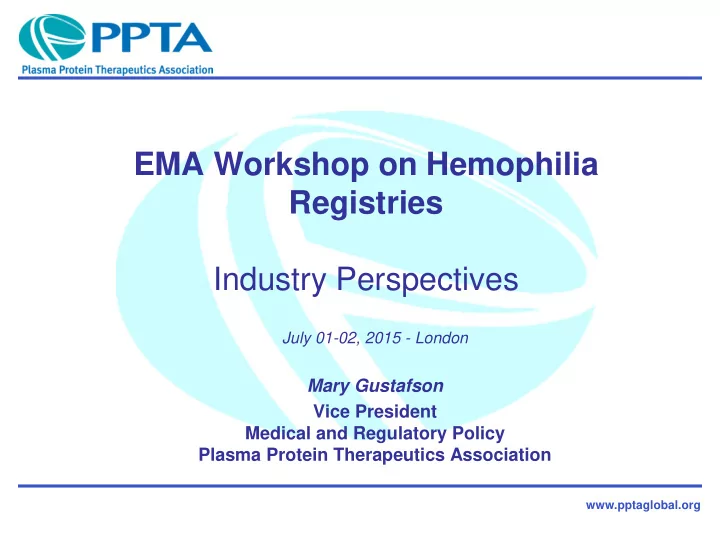

EMA Workshop on Hemophilia Registries Industry Perspectives July 01-02, 2015 - London Mary Gustafson Vice President Medical and Regulatory Policy Plasma Protein Therapeutics Association www.pptaglobal.org
Industry Collaborators – Birgit Reipert (Baxalta)* – Jeffrey Spears (Grifols)* – Prasad Mathew (Bayer)** – Nenè Calcinai (Kedrion)* – Robert Kozak (Bayer)** – Alberto Mancin (Kedrion)* – Pedro Paz (Bayer)** – Dominique Pifat (Kedrion)* – Haiyan Jiang (Biogen)** – Kasper Lamberth (Novo Nordisk)** – Debra Bensen-Kennedy (CSL – Lewis Pollack (Novo Nordisk)** Behring)* – Stine Louise Reedtz-Runge (Novo – Hartmut Landgrebe (CSL Behring)* Nordisk) ** – Thomas Barnett (Grifols)* – Albert Farrugia (consultant) – Isabel Henkel (Grifols) * – Timothy Hickling (Pfizer)** * PPTA member ** non-PPTA member EMA Hemophilia Registries Workshop July 01-02, 2015 www.pptaglobal.org Slide 2
Focus on the Patient • Hemophilia products – Plasma-derived – Recombinant – Long-acting • Industry looking for ways to improve circumstances and outcomes for patients > can registries help? • Not enough has been learned about patients > can registries help? • Opportunity and value of genotyping in predicting immunogenicity > can registries help? EMA Hemophilia Registries Workshop July 01-02, 2015 www.pptaglobal.org Slide 3
Registries General limitations: • Large number of competing registries – competition for limited resources & potential for biased participation • Collection of large amount of data, without clear focus on answering particular question – large databases with data entry compliance issues • Some registries designed to answer very specific questions – if data mined for non-originator questions - answers are incomplete or misleading EMA Hemophilia Registries Workshop July 01-02, 2015 www.pptaglobal.org Slide 4
Registries General limitations (continued): • Data entry not consistently monitored/ tracking not in place – Data from single patient potentially entered across multiple participating centers > avoid double reporting/counting – Patient often lost to follow up (move/death), thus patient status may be inaccurate > ensure adequate follow up • Examples of different registries: >PedNet (RODIN study) >EUHASS EMA Hemophilia Registries Workshop July 01-02, 2015 www.pptaglobal.org Slide 5
Registries 1. Experience with product-specific and disease-specific registries and pros & cons: • Valuable tool for collecting information on rare events/ rare diseases, but also on epidemiology and public health profile EUHASS registry: – Product-specific and disease-specific – Well-designed registry collecting information to answer specific question – Inclusion of large network of participating centers, with monitoring and confirmation of data – Can be used to answer specific clinical questions EMA Hemophilia Registries Workshop July 01-02, 2015 www.pptaglobal.org Slide 6
Registries 2. How to strengthen the outcome of registries? • Consolidate existing registries into basic registry/ies to answer specific question/s and obtain concise pertinent information > relevant scientific information is added • Ensure data entry is up-to-date and accurate > requires proactive review program • Design registries to answer specific questions with defined core data set • Collect data more systematically, avoid administrative hurdles • Data mostly generated in hemophilia treatment centers (HTCs) EMA Hemophilia Registries Workshop July 01-02, 2015 www.pptaglobal.org Slide 7
Registries 3. How can industry contribute? • Support and technical know-how – Support consolidation of many individual registries into 1-2 covering most important questions and complying with clean data entry > avoids patchwork distribution of data and misleading information (if data mined for questions not part of original database purpose ) – Assist in setting up centralized data entry process > data entered through single portal > minimizes demands on site staff and helps with simplification and site participation EMA Hemophilia Registries Workshop July 01-02, 2015 www.pptaglobal.org Slide 8
Registries • Point to consider: – Registries are a public health tool > shouldn’t support ideally come from public health domain? EMA Hemophilia Registries Workshop July 01-02, 2015 www.pptaglobal.org Slide 9
How can registries help • Answers to particular, well-defined clinical, laboratory or genetic questions: – Monitoring of patients’ outcomes (inhibitor development) • Inform on design of future drug development and clinical trials: – Currently no formal link between registries and ongoing clinical trials > utilization as predictive tool and risk reduction for patient safety and drug development through: – Immunogenicity prediction/assessment implementation – HLA typing and genotyping (considering ethnicity, geographical location) – Patient stratification, especially with small patient populations EMA Hemophilia Registries Workshop July 01-02, 2015 www.pptaglobal.org Slide 10
How can regulators help 4. How could/ should regulators contribute? – Commitment to include registry data in phase IV clinical trial assessment – Revision of requirements for rare disease assessment based on availability (and quality) of registry data – Support development of unique patient identifiers for registries EMA Hemophilia Registries Workshop July 01-02, 2015 www.pptaglobal.org Slide 11
Global topic • FDA Immunogenicity Workshop: September 17 - 18, 2015 (NIH, Bethesda, Maryland, USA) • Topics: Genetic basis of immunogenicity of coagulation proteins – Glycobiology and immunogenicity – Animal models – Fusion proteins – Registries • Participants: – PPTA task force – Steering committee: FDA, NIH, PPTA, NHF, Clinicians EMA Hemophilia Registries Workshop July 01-02, 2015 www.pptaglobal.org Slide 12
Thank you For further information, comments or questions, please contact: Mary Gustafson Vice President, Medical and Regulatory Policy Plasma Protein Therapeutics Association (PPTA) mgustafson@pptaglobal.org EMA Hemophilia Registries Workshop July 01-02, 2015 www.pptaglobal.org Slide 13
Recommend
More recommend